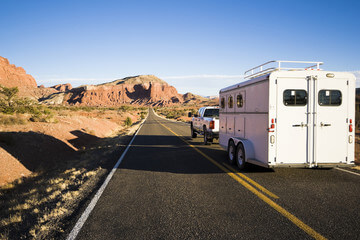Minimizing Trailer Stress
By Robert Eversole
 Summer is officially here and, in spite of high fuel prices, trail riders are hitting the highways in large numbers to haul their horses and mules to “work” as they travel to that perfect riding destination. In my last article, we discussed the fundamentals of trailer maintenance and how to check your equine partner’s travel accommodations for safety. Let’s expand on that topic and talk about how to create an equine friendly environment while we roll over the blacktop. There are several topics to discuss around trailering such as: front or slant load, bumper pull or goose neck, step up or ramp, tie or not tie, and more. Today we’ll narrow our focus and concentrate on two factors: dealing with heat and driving styles.
Summer is officially here and, in spite of high fuel prices, trail riders are hitting the highways in large numbers to haul their horses and mules to “work” as they travel to that perfect riding destination. In my last article, we discussed the fundamentals of trailer maintenance and how to check your equine partner’s travel accommodations for safety. Let’s expand on that topic and talk about how to create an equine friendly environment while we roll over the blacktop. There are several topics to discuss around trailering such as: front or slant load, bumper pull or goose neck, step up or ramp, tie or not tie, and more. Today we’ll narrow our focus and concentrate on two factors: dealing with heat and driving styles.
Regardless of how far we haul, we’re asking a lot of our horses. Some owners forget that a horse’s stress about trailers doesn’t end when they’re loaded; being bounced around and subjected to heat can be stressful to any horse.
Handling the Heat:
Most horses’ comfort range is 30-75 degrees, depending upon the breed. While this is a wide temperature range, consider the wide range of horse breeds from cold loving Icelandics to thin coated Arabians. They have each adapted to different environments. Now consider the trailer and how hot it can become on a warm sunny (think perfect riding weather) day. Studies have shown that temperatures inside trailers can easily be 10 to 15 degrees greater than outside temperatures. That perfect 80 degree day just became a hot and humid 95+ degrees inside the trailer. So take some precautions to ease heat stress.
Carefully select departure/arrival time schedules to avoid the hottest parts of day (i.e. leave early when it’s still cool).
Ensure your horse is well hydrated beforehand and offer water frequently (at least every 4-6 hours) during longer trips.
Keep the trailer moving and avoid parking for long periods. The wind’s cooling effect is most helpful so keep vents and windows open. This also requires you to check road conditions prior to the trip to avoid congested areas. A traffic jam is even more stressful for your equine!
Don’t Drive Your Horse Crazy:
A second factor to consider when you’re hauling is your driving style. Driving habits are a major factor in the comfortable trip for your horse. Towing a horse trailer is, as you know, very different than going for a Sunday drive in your car. Trailers are long, heavy, and loaded with your favorite riding partners. Your consideration of your equine passengers will not only reduce their stress during the trip, it will also help in having them load willingly into the trailer at the start of your next trip!
Avoid sudden stops and starts. Slow and steady starts and stops will give your horses time to adjust and to brace themselves. Think ahead and anticipate what could, would, or should happen before the situation occurs.
Passenger friendly driving also includes careful braking and smooth cornering as key elements to towing a trailer responsibly. Take turns easily and wait to resume your normal speed until the rig has straightened out.
Take it easy when traveling over bumpy roads. Take your time; the mountains won’t leave before you get there.
One of the best ways to learn first-hand what your equine friends are going through is to take a ride in your horse trailer. Find a large parking area or your driveway (not on the road in a bumper pull trailer, it’s illegal) and have a trusted someone take you for a brief trailer ride. I can almost guarantee that this exercise will cure anyone of poor trailer driving habits.
As always, for more information on this and other topics visit www.TrailMeister.com
Published July 2011 Issue

Robert Eversole, ”the trail meister,” owns www.TrailMeister.com, the largest database of horse riding and camping areas in the U.S. with free trail and trailhead information, trail maps, and much more to help horse enthusiasts experience the joys of trail riding. Robert is a registered riding instructor with PATH International, a mounted search and rescue team member, and a U.S. Marine who has served on the board of the Backcountry Horsemen of Washington (BCHW). He is enjoying his new career helping fellow trail riders stay found and safe on the trail. When not on the trail, The Trail Meister resides near Spokane, WA and teaches land navigation to a wide variety of outdoor groups across the nation. For North America’s largest horse trail and camping directory, trail tips, and more, visit www.TrailMeister.com.

